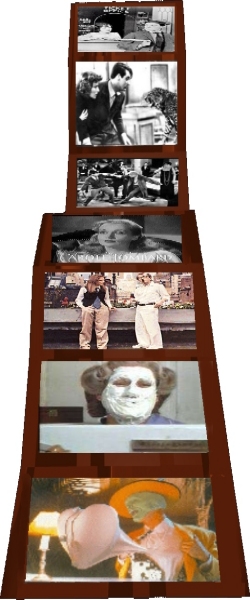
Screening:
MW, 12:30-2:50
Class:
TTh, 12:30-1:50
Room:
Thompson 101
Instructors
Claudia
Gorbman
Padelford
A-504
543-2288
Hours:
W, 10:30-12:30
Kimberlee
Gillis-Bridges
Padelford
A-16
543-4892
Hours:
TTh, 11:30-12:30
Last Updated:
4/23/00
Comments
or queries
|

Notes and Study Questions
on Herbert Levowitz,
"Smiles and Laughter:
Some Neurologic, Developmental, and Psychodynamic Considerations"
Levowitz is a psychiatrist,
seeking clues to the mechanism of laughter in terms of the brain’s wiring
and human development. Notice that we’re far away from film theory
in reading Bergson, Levowitz, and Freud, but dipping into other kinds of
theory in order ultimately to explore the appeal of movie comedy.
-
What aspects of the cortical
and subcortical regions of the brain allow for laughter, in Levowitz’s
assessment? Would Levowitz and Bergson, over a cup of tea, ultimately agree
or disagree on what they mean by laughter being the province of human beings?
-
Smiling is a "scaffolding
of pleasurable reciprocal exchange" and laughter is "a much stronger reaction"
of pleasure, which can consist in gratification of needs, the result
of tension abatement, the resolution of tensions or fears, or the anticipation
of pleasure itself. Once you’ve read the entire essay, recap the examples
of these in babies, in childhood, and in adulthood.
-
Pleasure at a "new epistemological
triumph"—i.e., a cognitive triumph or the mastery of a new skill, is so
intense in children as to lead to laughter. How can the mastery of, say,
standing or walking for the first time, seeing your mother’s eyes again
for the first time in "peek-a-boo," or finding your first Easter egg, be
seen as the ancestor for "getting" a joke?
-
What’s the mechanism that
leads to laughter with regard to the forbidden (anal, sexual, hostile/aggressive)?
To misquote Tina Turner, what’s guilt got to do with it?
-
If a child sees another
person fall—or, to use our frequent example, slip on a banana peel—why
will the kid laugh? To what extent will Levowitz and Bergson agree or disagree
on why people laugh at the banana peel scene?
-
When does verbal humor
develop in children? How can we see it as a continuation of (developmentally)
earlier stimulations to laugh?
-
Does Levowitz’s (and Freud’s)
notion of sexuality and aggression channeled into the disguised form of
jokes account for the jokes told in class over the last few weeks? Think
of them: superiority over Norwegians, blondes, Jews, lawyers, professors
sleeping with young TAs, "forbidden" subjects—18 going into 54 more times
than vice versa, Tampa and Green Bay Packers merging into the Tampax, or
renting out the basement of your outhouse. What kinds of jokes do Levowitz’s
comments so far not account for?
-
Finally, what do you think
of Levowitz’s developmental theory of laughter? As adults, are we still
really laughing in response to mentions of caca, penises, and hostile wishes—just
in more sophisticated verbal disguises?
-
And finally finally, try
to explain via Levowitz some of your favorite comic moments from Bringing
Up Baby and Sullivan's Travels, both visual and verbal. Is his
theory adequate to explain them?
|
 |

